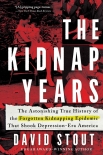The Kidnap Years:, David Stout [readict .txt] 📗

- Author: David Stout
Book online «The Kidnap Years:, David Stout [readict .txt] 📗». Author David Stout
It’s certain that with the news of the kidnapping breaking on the same night, the editors weren’t much concerned with the NYU dinner. Soon, it would be reported that Chancellor Brown was to blame for Lindbergh’s failure to attend. In a note to Lindbergh before the dinner, the chancellor had apparently said the event was to be on the fourth of March, not the first. So Lindbergh innocently dined at home on March 1, the night his son was taken from his crib.
For conspiracy theorists, the seeds of suspicion had been planted.
Three days after the kidnapping, Hoover went to Hopewell, New Jersey, to offer his assistance to Charles and Anne Lindbergh. They declined to see him. Hoover then conferred with Colonel Herbert Norman Schwarzkopf, head of the New Jersey State Police, who told the FBI boss that his people could manage things by themselves. Schwarzkopf was leery of federal men parachuting into his cases (although the Treasury Department would play a vital role as it recorded the serial numbers on the ransom currency), and he would soon have plenty of turf battles without having to worry about Hoover.
But Hoover craved a role in the case, even hoping he might be put in charge overall despite the absence of an officially defined role for the FBI. U.S. attorney general Homer Cummings even wrote to Governor A. Harry Moore of New Jersey that “a coordinator of tested ability was available in the person of J. Edgar Hoover.”22
The governor ignored the suggestion, which had undoubtedly been inspired by Hoover himself. As the investigation lurched on, it became clear that Hoover, glory hound that he was, had precisely the organizational skills that were sorely needed.
*The scene and dialogue are derived from the testimony in the trial of the suspected kidnapper, which began on January 2, 1935, and was exhaustively covered by the New York Times (www.nytimes.com).
CHAPTER SIX
THE BOY IN THE WALL
Niles, Ohio
Wednesday, March 2, 1932
As Americans were waking up to the horrible news about the Lindbergh baby being kidnapped the night before, they worried about their own children: Were they really safe playing in the streets or in the fields? Were they safe in their own homes?
James DeJute Jr., the eleven-year-old son of a contractor in Niles, a small city in northeastern Ohio, had been fighting a cold, but he was well enough to go to Lincoln School. Jimmy, as he was called by just about everyone, happened to be wearing his Lindbergh-style pilot’s cap.
It was no secret that Jimmy’s father, James Sr., prospered as a contractor. But the DeJute family was hardly famous, and it was the opposite of high society. An outsider might have assumed that the DeJutes were descended from French aristocracy. In fact, the name “DeJute” was invented, shortened from the Italian “DeGuido.”
This morning, Jimmy was accompanied by his cousin, Anna. As they took a shortcut through the grounds of St. Luke’s Episcopal Church, they saw a brown coupe parked by the curb. The hood was up, and two men seemed to be looking at the engine.
“Hey, little boy, come here!” one of the men called out, as Anna would recall later.
Jimmy approached the men. When he got close, they grabbed him. He yelled and struggled and broke away for a moment, but the men caught him and put him in the car in front of his screaming cousin. Then the car sped away.
Other schoolboys noted the license plate number. But the license number was useless: the plate was soon found behind a church, where it had been tossed. It had been on a black coupe stolen in Niles in early January.
Jimmy had a brother, Anthony, who was several years younger—just a toddler, really. Anthony was too young to comprehend what was happening in his parents’ house. All he knew was that his mother and father were afraid. They went from room to room, whispering to each other, and his mother’s eyes were red from crying. Now and then, the phone rang. His father whispered into it.
My brother is gone, Anthony thought. And maybe they think it’s my fault.
For Anthony had wished that his older brother would go away. From the time he first had feelings, Anthony sensed that his parents liked Jimmy better. Now, Anthony’s wish had come true. His brother was gone. Anthony wished that Jimmy would come back. He prayed as hard as he could before falling asleep.*
The agonizing wait went on until Saturday, March 5, when a veteran Trumbull County detective, W. J. Harrison, who had sources on both sides of the law, got a cryptic phone call. “Go to Scotty’s place, and you will find that DeJute kid from Niles,” the caller said.
Lawmen in the region were familiar with “Scotty’s place,” a recently abandoned gambling den that stood behind a barbecue joint and a filling station on a road on the outskirts of Youngstown, Ohio. The previous year, a woman who ran a house of pleasure had been kidnapped and held at Scotty’s until she arranged for a ransom to be paid.
Deputies from Trumbull and Mahoning Counties staked out Scotty’s place, which was supposedly vacant. So why was smoke coming from a chimney? The lawmen rushed the building and kicked in the door.
There was no one there. The interior was devoid of furniture, though there were rugs on the floor along with an old mattress and a couple of pillows. A fire was burning in the kitchen stove, and a partially eaten loaf of bread lay in a corner.
Then Detective Harrison spotted a math textbook on the floor. On the flyleaf was written “James DeJute, 327 Robbins Avenue, Niles, Ohio,





Comments (0)